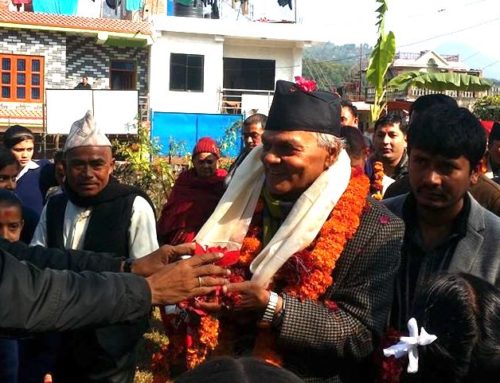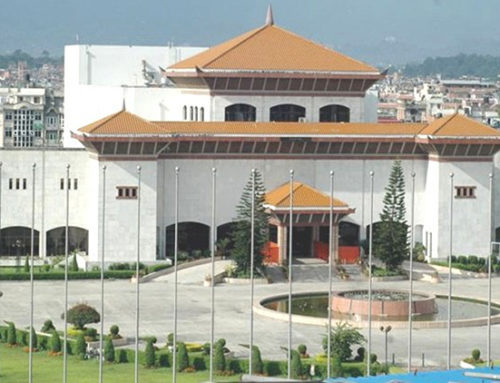Distinguished Guests and friends of Nepal It is indeed a great pleasure for me to find myself among you and share our ideas and opportunities with you for the socio-economic development of Nepal. Nepal is one of the least developed countries with almost half of the population living below the poverty line. Therefore, the government has accorded the highest priority to poverty alleviation. After a long struggle, a multiparty democratic system has been established in Nepal. With three general elections since the beginning of this decade, our people have experimented with almost all kinds of possible political equations and have finally come to the conclusion that only a stable and democratic government can create an amicable atmosphere for social and economic development. Now that we have already got a stable government in place, a conducive environment for investment programs is assured with the certainty of policies and their continuity.
In order to promote economic development, we have continued a liberal and competitive market-oriented economic policies adopted by the first democratically elected government after the restoration of the multiparty democratic system in the early Nineties. Further, we have overcome hurdles such that the economic development initiatives be taken by the non-governmental sector, be it a citizen of Nepal or a friend of Nepal like you can foster. I have a pleasure to appreciate the bilateral initiatives with Japan, that have made landmark changes in Nepal. For example, the first storage based Kulekhani hydropower generation, 800 tons per day cement production factory at Udayapur, Surveillance Radar installation in the International Airport at Kathmandu, Improvement of City Transport in the Kathmandu valley, construction of numerous important bridges, an important road linking Kathmandu to the eastern part of Nepal, Radio communication network to regionalize the medium wave transmission, fisheries program in western Nepal, and the establishment of the first teaching hospital in Kathmandu. These are only a few examples of Japanese bilateral initiatives of over one billion dollars in Nepal. All of the initiatives have left a lasting friendship you have shown to our country in the path of sustainable development.
The continued support in developing human resources in diverse fields is greatly appreciated by the Nepalese people. Along with the bilateral initiatives at the government level, we feel that it is the time now for business people like you to come to our country and identify investments in Nepal. It gives me pleasure to inform this gathering that since the beginning of this decade, because of our liberalized economic policy and foreign investment promotion, more than 500 investment ventures totaling about 900 million dollars, of which foreign component is almost 200 million dollars, have already been registered for development in Nepal. However, considering the need of our people and the market accessibility from Nepal, we have taken this response from the private sector as the beginning of the process that will gain due momentum in the future. Our policy is to allow you to fully operate such investment by yourself, and we have legislated this facility for your convenience. We have extended opportunities for your investments in all economic sectors and also infrastructure development programs. The opportunities are both for domestic needs and for export. The first on the list of such projects that we have laid out for investment is the development of water resources projects in Nepal. With about 225 billion cubic meters of water available annually and a suitable terrain rising from 100 m to more than 8000 meters in about 100 kilometers distance, our country offers a great potential for investment in hydropower development, a pollution-free investment.
The hydropower potential of Nepal is about 83,000 MW of which about 44,000 MW have been studied to be economically feasible. In order to bring the investment from experienced investors like you in hydropower, we have issued a generous hydropower development policy, one of the first of its kind in the whole South Asian Region. The major thrust of the policy is to attract domestic as well as foreign private sector investments for internal consumption as well as export. We have issued Electricity Act (1992) and Electricity Regulations (1993) to make clear provisions for investor’s investments such as tax exemption, import facilities, foreign exchange facilities, and indiscrimination as to the investment, including joint ventures where total foreign investor ownership and operation is permitted. In order to smooth out the investments in hydropower, we have established a one-window service system through the Electricity Development Centre. This provision has facilitated the interaction of private power developers with government agencies at all stages of licensing and operation of projects. I would like to inform you that our call has not gone unheard. We have been able to bring investments in hydropower both from foreign and domestic investors. To date, we have six hydropower projects, either at the stage of construction or at the finalization of necessary details for construction. Before coming to Japan, we have advertised an additional eleven projects totaling more than 1,500 MW for development and another eleven totaling more than 3000 MW for a feasibility study. Friends, We are ready for it and I would like you to grab this opportunity and have your investment presence in Nepal. We are serious and we mean business. For the hydropower projects, there are more sites to be developed especially for export. Our amicable and balanced relation with India and China provides that opportunity to you.
India especially is in dire need of a consistent electricity supply to fuel its economic development. The planners in India have forecasted demand to the tune of about 58,000 MW by 2010 in the Northern Indian Grid. However, with all the plans on the table, India would still have about 20,000 MW deficit in the Northern grid alone. Therefore, if India has to meet its need for industrialization, it would need electricity and Nepal could offer a window of opportunity for such quantum of electricity and it is also a feasible option. We have initiated power-sharing and interconnection facilities with India and you may expand on these arrangements. With the conclusion of the Integrated Mahakali Treaty to develop 6,480 MW of power in Pancheswor, we have been able to foster the atmosphere of harmonized electricity development between India and Nepal and you could be one of the partners in this process. India is in the process of interconnecting the electricity grid in a few years time. Once that happens the accessibility to Indian market would increase tremendously. We should grab the opportunity generated in India due to their liberalized economic policy as well. If we are here to attract investment in hydropower development, we are also here to attract you to develop industries feeding to hydropower development such as production and assemblage of turbines, governors, penstocks, electrical fixtures, efficient end-use devices and so on.
Your country has produced some of the most efficient such devices in the world and now there is a new market in Nepal to explore. In order to boost industrial investments in Nepal, the government has issued Industrial Policy (1992), Foreign Investment and Technology Transfer Act (1992), Industrial Enterprises Act (1992), and have further strengthened the basis for direct and indirect investments in Nepal. The Industrial Policy identifies foreign investment promotion as an important strategy in achieving the objectives of increasing industrial production. The Foreign Investment and Technology Transfer Act lays down the basic law governing foreign investment in the country. The Industrial Enterprises Act (1992) smoothes the provisions for congenial atmosphere to develop competitiveness among the enterprises. Besides, it gives a list of national priority industries for development. Various concessions have been provided for the investments in national priority industries. For example, in the construction and operation of Road, Trolley Bus, production of pollution control devices, additional rebate on corporate income tax up to 50% has been given. Foreign investment in industries can directly be cleared through a high level one window committee in the Department of Industry or through the Industrial Promotion Board. Nepal does not want to lag behind in this era of the internet and connecting people together for information and market. Therefore, the government has taken a policy to develop Information Technology Park to increase software and hardware development activities geared towards meeting the information and analytical needs of the people.
We have formed a committee to develop a technology park to grab the young and bright graduates of our universities. I solicit your partnership to develop the Information Technology Park and to outsource your information technology-related hardware and software activities to Nepal. Our professionals in this area are motivated and eager to contribute to the development of Nepal. With low wages and good motivation, I can assure you that professionals out there in Nepal can be trained to deliver services much faster and much cheaper. We have a big basket of opportunities for you, show your willingness to grab one or some of them, if not all. I encourage and urge you to share with us your resourcefulness to develop ourselves from within. I would like to request you to kindly visit our embassy here for details on your possible involvement.
But as “seeing is believing”, I extend my warm welcome to you all here to visit Nepal as soon as possible and grab the opportunities right there. I look forward to your visit to Nepal. Thank you.




